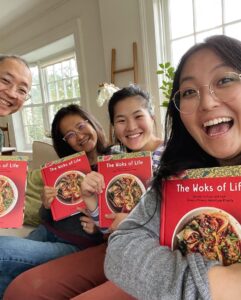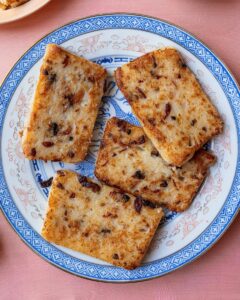By Shirley Ng, AsAmNews Staff Writer
Everybody loves Chinese cuisine, so when a new cookbook is published and its recipes appear pretty authentic, plus throw in some enduring family stories, why wouldn’t the Asian American community support it? Of course they would.
A New York Times Bestseller, Woks of Life, by Bill, Judy, Sarah and Kaitlin Leung is under fire by some Chinese Americans for using Simplified Chinese instead of Traditional Chinese in their recently published family cookbook.

S. Tam, wrote in the food group, “I am glad I checked this cookbook out from the library instead of buying it. The writing is fine, the photographs are beautiful, and I can find the same recipes from their website. But, why the *beep* are they using Simplified Chinese writing instead of the beautiful Traditional Chinese writing? It is the same as writing “how R U?” instead of “How are you?” Egg tarts should be 蛋撻 not 蛋挞, 廣式肉粽 not 广式肉粽. Also, noodle without wheat 麥 on the side is 面”face”, not 麵“noodle.”
AsAmNews reached out to the Leung family and their daughter, Kaitlin responded.
LATEST STORIES

“Simplified Chinese is what we’re more familiar with. My sister and I have some education in Chinese. We studied it in college and it was all in Simplified Chinese. My mother grew up learning Simplified Chinese, and that’s what she writes. My dad speaks Cantonese, but he’s not that strong in his reading and writing.
“Me and my sister are not that strong in our speaking, but we prefer the pin ying (of Mandarin) so that’s how it shook out,” said Kaitlin.
Simplified Chinese was created to enable the Chinese to become better readers and increase literacy when the communists took control of China in 1949. It has less strokes so it’s easier to read and write. However, many feel that Simplified Chinese actually did the opposite. It “dumbed down,” lowering the intelligence of its people. Traditional Chinese is still highly respected as the first written language for many Chinese, especially for many Chinese elders before the communist regime took control, so there is always a bit of pushback on using Simplified Chinese.

“S. Tam” told AsAmNews, “I just think that the Woks of Life website is so popular among foodies, they should respect Chinese cultures by including traditional writing. It is really insulting to see the Chinese character, “face” in place of Chinese character for noodle because we eat noodle, we’re not eating face.”
There is much to make a fuss about from these ardent Chinese readers who are also foodies.
Aside from the use of Simplified Chinese in the cookbook, Chinese Americans also called out how the pin ying (romanization of the pronunciation of Chinese) of the food names on the recipes did not correspond with the Simplified Chinese. Kaitlin already said that her family speaks Mandarin to each other, but reads and writes (except her father) in Simplified Chinese, but the pin yin should be Cantonese in the cookbook to some Chinese Americans.
Take for example, Woks of Life includes a recipe for a very traditional and highly celebrated comfort food, “Joong/Jung.” This it is spelled in Cantonese pin yin. However, the Leung family spells it, “Zongzi.” The pin ying is in Pu Tong Hua (Mandarin dialect) and not in the Cantonese dialect to correspond to the Simplified Chinese they chose for their cookbook.
“I can read traditional Chinese with sufficiency. Simplified version, not so much and frustrating for me. I cannot buy the book because of that,” wrote “J. Leung”.

An extremely unhappy “J. Chan” called them out on the food group, “Cantonese never uses “zung”, it’s JUNG! ALL those Qs, Xs, and Zs are all Mandarin Pu Tong Hua tones, not Cantonese!!”
This also occurred with their recipe for the “don tots,” as that is how I pronounce egg tarts in Cantonese, which “J. Chan” had a lot to say about.
“Gǎng shì dàntà” is PTH (Pu Tong Hwa), NOT CANTO!!!! If you’re writing about 港式蛋撻 Hong Kong style Dang Tat, USE CANTO, “Gǎng shì dàntà” is definitely NOT CANTONESE. Also, “挞” was simplified, We “Canto Hong Konian” NEVER simplified and NEVER sak for “Gǎng shì dàntà” in PTH. WTF!?!?, he wrote in the food group.

When we asked Kaitlin if she realized the pin yin and the Simplified Chinese did not correspond and why, she told us she wasn’t comfortable in answering that question. However, she told us, “In my impression they do (correspond).”
Browsing through the Woks of Life social media, there is a great excitement for the cookbook and many are calling their recipes authentic, while some fans are still waiting for theirs in the mail.
On the Amazon website, “J.Li” wrote, “I love the Leungs and their blog. I cook recipes online all the time, but I usually skip straight to the instruction, that is until I found the Woks of Life. Their writing is so down-to-earth, authentic and full of life. I enjoy the stories as much as the dishes. I cook their recipes on a regular basis and they never disappoint.”
One customer, “Edward T.” on Amazon wrote, “EXTREMELY disappointed in their choice of recipes. In short, rather than selecting more authentic dishes such as braised oxtail, beef with bitter melon, tripe stew, or snails in black bean sauce, they for the most part selected the most mundane take-out Chinese menu recipes familiar to anyone who has either dined at Panda Express/ PF Chang or has a copy of any generic Chinese American cookbook published in the last 30 years.”
Woks of Life appears to be selling well and the Leung family is busy promoting their cookbook. They were most recently in Chinatown’s Yu and Me Book store and have already done several television interviews. The cookbook has an 87% five-star rating on Amazon at of the time this story was written, so most reviews are great, except for the noncorresponding Chinese language and some unhappy Chinese Americans that pledge its allegiance to Traditional Chinese.
When AsAmNews asked Kaitlin what’s next for her and family, she said they were resting after a lot of busy promotion of the book, but they still have virtual events planned in December.
AsAmNews is published by the non-profit, Asian American Media Inc. Make a tax-deductible donation of at least $40 or pledge a monthly recurring donation of at least $10 by August 31 and receive a free copy of The Legend of Mu Lan: Heroine of Ancient China, the inspiration for the classic Disney movie. We are supported in part by funding provided by the State of California, administered by the California State Library in partnership with the California Department of Social Services and the California Commission on Asian and Pacific Islander American Affairs as part of the Stop the Hate program. To report a hate incident or hate crime and get support, go to CA vs Hate.










S Tam doesn’t get to dictate the language an author writes in. These authors chose simplified Chinese. If Tam doesn’t like that? He or she shouldn’t buy the book.
Would Tam also demand that we read and write in the middle English that Chaucer used? There are some people who would argue that middle English is much more elegant than our current modern American English.